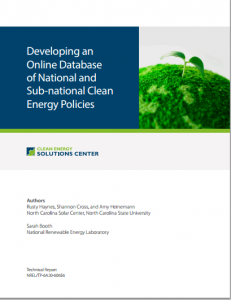Full Title: Developing an Online Database of National and Sub-national Clean Energy Policies
Author(s): Sarah Booth, Rusty Haynes, Shannon Cross, and Amy Heinemann
Publisher(s): National Renewable Energy Laboratory and the Clean Energy Solutions Center
Publication Date: June 1, 2014
Full Text: Download Resource
Description (excerpt):
Around the world, national and subnational (e.g., state, provincial, and municipal) governments are enacting policies and providing financial incentives related to clean energy. As the number of policies and incentives grows, it becomes more difficult for consumers, businesses, researchers, and policymakers to determine how they will impact clean energy projects.
The Database of State Incentives for Renewables and Efficiency (DSIRE) was established in the United States to provide summaries of energy efficiency and renewable energy policies offered by federal and state governments. Since the launch of DSIRE in 1995, the number of policies and incentives included in the database has grown from just a few hundred to more than 2,700. DSIRE, which is funded by the U.S. Department of Energy (DOE), is considered the premier public resource for information on clean energy policies and incentives in the United States. In 2012, DSIRE averaged more than 574,000 visits per month and more than 170,000 unique visitors.
Many other countries have expressed interest in creating a similar database to provide online, easy public access to national and subnational clean energy policy information. In 2011, the DOE partnered with India’s Ministry of New and Renewable Energy (MNRE) to develop the Indian Renewable Energy and Energy Efficiency Policy Database (IREEED). Work began on IREEED in the fall of 2012 and the website was launched on September 20, 2013 (www.IREEED.org). The development of IREEED was funded under the U.S.–India Energy Dialogue and the Clean Energy Ministerial.
